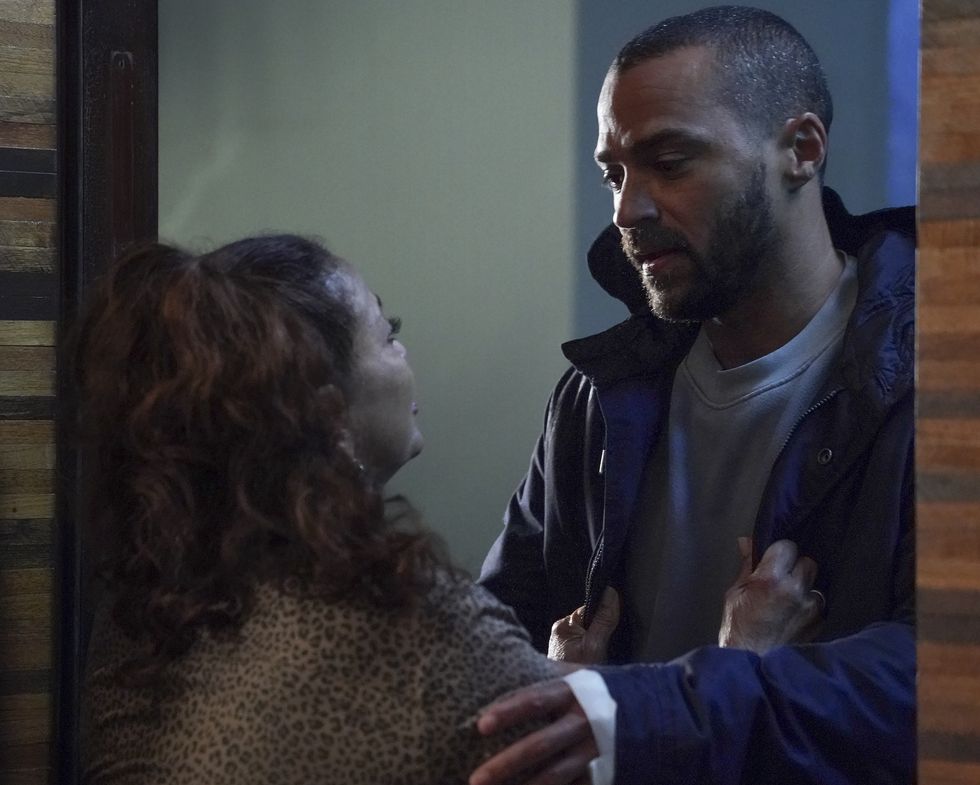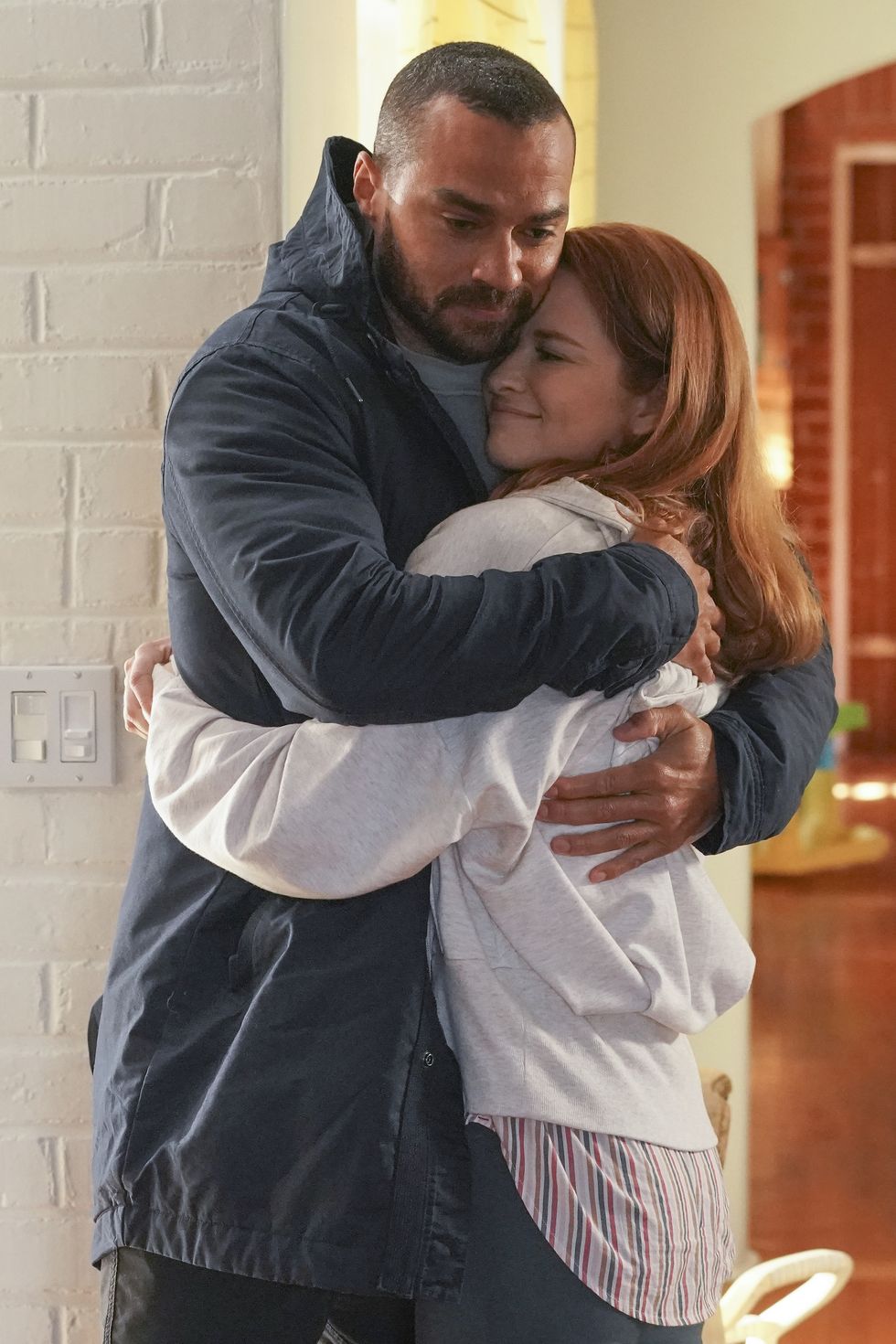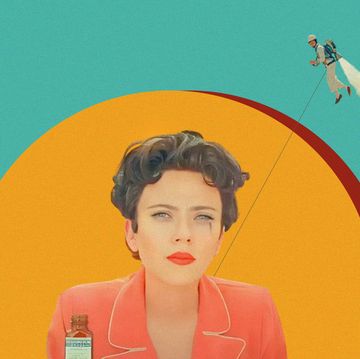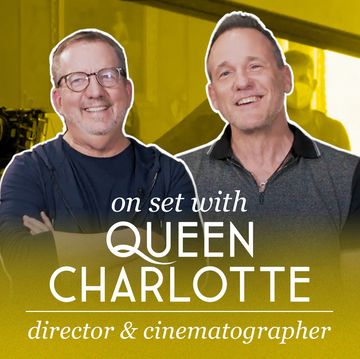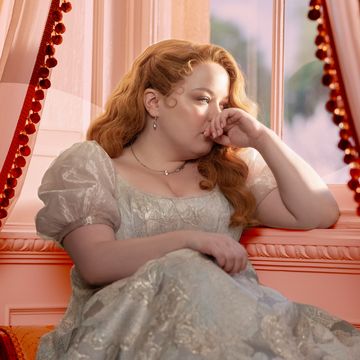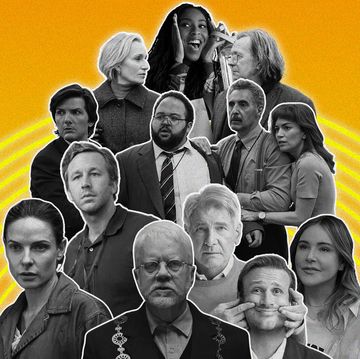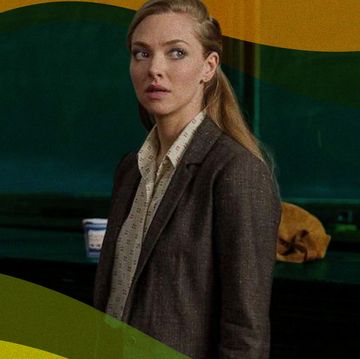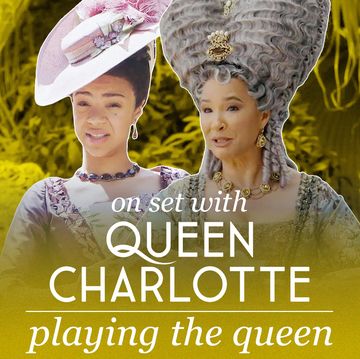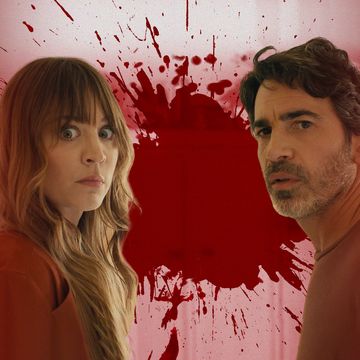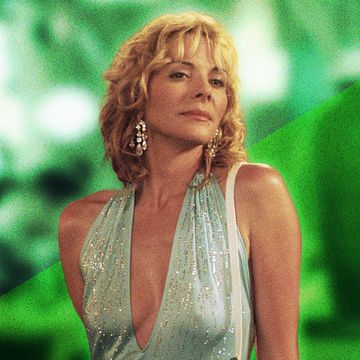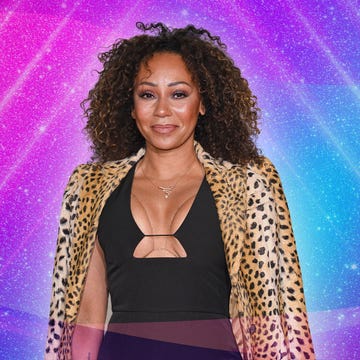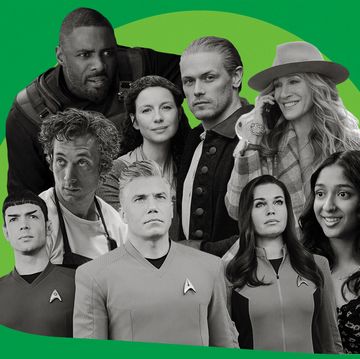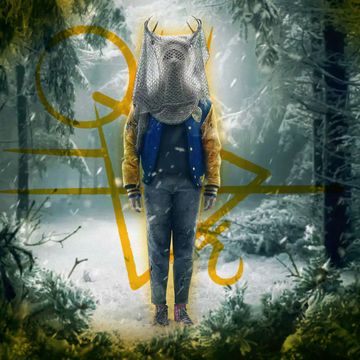As much as it pains us, it’s come to that time: Dr. Jackson Avery — our Pretty Boy, our Mr. Green Eyes, our one-half of the Plastics Posse, our Dr. Fancypants — is leaving Grey Sloan Memorial Hospital. And with that, after 12 seasons, Jesse Williams, who faithfully embodied Avery for so many years, is departing Grey’s Anatomy.
“I think it’s almost reverse engineering,” Williams says of Avery’s exit. “Like, it’s not so much that I know exactly where this person would go, but I know that he’s increasingly unsettled and needs to go. Doesn’t mean he can’t come back; doesn’t mean he won’t stay a doctor. But this person is bottled and needs to get out.”
In the episode “Look Up Child,” we found out that Avery is going to set off for Boston to run the Catherine Fox Foundation with the hopes and determination that he can change the systemic racial injustices within medicine and the healthcare industry. In his final episode, “Tradition,” tears were choked back as he made his farewells. And in true Grey’s TV-twist fashion, Koracick decided to follow him and dedicate his own (white, privileged) life to fighting the good fight too. (To find out what actor Greg Germann thinks about his own character's big move, read here.)
“This last episode was super-cathartic and really entwined in truth,” says Williams. “My farewell to Meredith — you know, me and Ellen are homies. It’s all been very emotional. Much more emotional than I anticipated.”
Because Williams is a prolific and thoughtful talker, without further ado, read below to find out more about how important engaging with the fans is to him (despite his awkward shyness), what he thinks about April Kepner and Avery’s situation, and why he’s optimistic about the movement toward equality in America.
VALENTINA VALENTINI: How did you find out that this was going to be the end of the road for Jackson Avery?
JESSE WILLIAMS: It was something that had been kicked around. Because the show has been going on for so long and so many folks have come in and out, we’ve talked often about the ways in which people exit. We thought that as Jackson’s self-discovery mounted — as he continued to learn more, expand beyond the walls of the institution that he works in, challenge the relationship with himself and his mom, realize the impact that his father’s absence and abandonment had on his ability to maintain relationships, look back at his life and his marriage and his inability to find connection that was meaningful — that this person was growing. He was growing out of his space, and he needed to explore. We established him doing these wilderness explorations, but what really is that? What are you looking for, or what are you running towards or away from? As what was happening out in the world started to impact him, we just realized that it made sense that he would evolve.
VV: Avery’s mother, Dr. Fox — this powerful, influential, loving woman — do you see parallels there with how you hold up Black women in your own life?
JW: All of us pursue attainable goals — goals that seem realistic. And the only way things seem realistic, generally, is if you’ve seen them done before. No matter what your upbringing — and Jackson’s was the polar opposite from mine; he was rich, and I was very not — you see the world around you through the lenses that are provided to you. To have people in your life who are trailblazers, who don’t take no for an answer, they have high ambitious drive, it can’t help but impact you and propel you forward. And I certainly can relate to that for people in my life.
VV: In addition to his mother, Avery says something in his last episode, that he learned from Miranda and Richard who he wanted to be.
JW: That’s actually exactly who I was thinking of: Miranda. Meaning, who I really was thinking of was Chandra Wilson. Both Chandra and Jim Pickens, in real life, have been incredible pillars and examples. Aside from the fact that they’re supremely talented and awesome to watch, Chandra is also an incredible director. She is the first person I shadowed as a director. She was the first person to give me tutelage and guidance as a director — her and Debbie Allen. Two Black women who’ve been doing it at a super-high level against the odds for a long time. And Jim, both on set and off, is stoic, smart, wise, and gentle. Both Chandra and Jim are so calm, which can’t be overstated in its value. I’m so grateful to both for their examples, and it has directly and consistently impacted me as a person and as a performer.
VV: Those scenes with Avery’s dad ... wow. Now, would you describe those conversations as cathartic?
JW: Absolutely. This is a journey that I found myself on, both in preparation and also in the moment, that these are experiences that Jackson has both been preparing for his whole life and is completely unprepared for. You can’t map that out. In the world of toxic masculinity and masculine father to son — lionizing of a figure, whether they’re good to you or not — there’s a whole lot of practice time I’ve had with my peers, fellow men in my life, where we’ve had conversations with our dads in our head a million times that we still haven’t had in real life. Maybe you haven’t confronted them for their benefit or for yours, or out of fear or out of bravery or uncertainty. It’s a swirl of emotions, the impact that our parents have on our lives.
I think that, as an adult coming into this phase of my life, I have become increasingly aware, fascinatingly, of the impact of my parents on my way of processing and how I understand relationship dynamics to function, what love is and isn’t, what worthiness is. All these self-identity, esteem things are very often tied to your childhood. The more I explore and learn about that, it can’t help but trickle into my life and my work. I’ve been very close to a great number of men, boys, families that don’t have fathers present in their lives, and I have seen its devastating and awesome, somehow, impact on them, and I was absolutely channeling my empathy with that and them throughout.
VV: Those scenes were really emotional. Somebody, give this guy an Emmy!
JW: They were really emotional. They were really exhausting and painful and personal, and even when I — thank you, by the way. When I went in for ADR, where you go into the booth and you watch a piece of the scene and you articulate the word a little more clearly so it can be looped in — it was maybe a couple of weeks after we shot it — seeing those scenes just kind of invaded me. It brought me back there and down, and I had to take a break for a second. It was not expected.
Seeing and experiencing that dynamic and that vulnerability, uncertainty, and pain, it’s real. Our job, when done well, if we’re lucky enough, is not acting; it’s real. I’m so glad that it seemed to have been impactful for folks.
VV: It was. The fans really seemed to respond. There were many tweets from people empathizing or talking about their own absent fathers, sharing their stories. What’s that like to handle?
JW: I haven’t really thought about that specifically in regard to those scenes, but only because so much of this is wrapped up in the story of Jackson leaving and the press around that. I haven’t really found myself headlong into sharing with the fans and listening to their experiences about Jackson’s journey. I will, though, and I should, because it’s super-important to me, and it’s really important interpersonal stuff.
VV: Does Avery’s move to Boston feel akin at all to the activism that you do outside of acting in your own life?
JW: It certainly informed the writing, with incredible collaborations from Felicia Pride and Elisabeth Finch alongside Krista Vernoff. We scribbled away at making this as real as possible. But I’m completely different from Jackson in a number of ways, and among them is that he is just now discovering some kind of attachment to movement work, whereas I have never known a life without it. I’ve been wrapped and surrounded by this work since I was a very small child. We all come to things at the time we come to them. There’s no better or worse. There’s no wrong. My experiences have been quite the opposite to Jackson because I align myself and relate to the people I’ve been fighting alongside and living with in the economic and racial class that I was raised in. That’s a lateral experience. But, for Jackson, somebody who’s lived in this ivory tower of privilege, he doesn’t know them; he doesn’t associate with working people, with folks who live on the margins, but he has a calling from inside. There’s something possibly more beautiful about that because he’s got a calling from inside of his heart that is making him look outward and mobilize. As a person and a performer, it’s been nice to embody multiple ways to the center.
VV: Speaking of centering, Avery’s relationship with April seems like it’s in such a good place now, and her willingness to uproot her life is massive. What are your thoughts on their journey?
JW: It was somehow even more amazing than I expected, and I had high expectations of being able to spend time with Sarah [Drew] and dive back into the reality of those characters. It was incredibly seamless. In real life, you’ve lived with and loved someone for a dense period of time or a long period of time; however you want to measure it, there’s a knowing. It’s a comforting thing. Everyone wants to feel seen and understood, which is to say, feel safe. And I, as Jesse, feel all those things with Sarah, and that is all the more useful for Jackson and April. They got through their humps, they’ve zoomed out, they’ve matured. They understand their abilities and where they lack, and don’t try to overstep. All these things are growing pains that happen in adult relationships, and it’s really nice to be able to see a future where things return to — and here’s this word again — calm. It’s hard for me to imagine them not finding a healthy groove in a relationship in the near future, whether that’s romantic or not. Jackson has been wandering in the wilderness, both literally and figuratively, for some time, not feeling known by people in his life; he doesn’t really have a male best friend, and he hasn’t really had a successful relationship since April, so it’s certainly nice to be known.
VV: It’s been almost five years to the day that your BET Awards speech brought down the house. How do you feel about where we’re at now in the U.S.?
JW: I feel fine. I live in a perspective of balance between the urgent and the reality of the long game of the universe. That might sound a little esoteric, but, in much of my life, matter is primary. There are incredibly important, urgent needs, abuses and atrocities happening, and they’re tangible, and we are being strategic about addressing them. No matter what, consciousness is rising. More people are more attentive to, receptive to, aware of the plights of others, the value of the lives of others — though we need to air-quote “others,” whatever that means. But there is an elevating of consciousness, and nothing can or will stop that. I can feel good about that without being passive. I also know that these are but blips in time; empires rise and fall, this stuff is a long game, who was on top 300 years ago doesn’t exist now, these things come up and down. I can’t stress myself out to the point of being empty for myself or others, so I try to create a kind of rhythmic and conscious scheduling and attentiveness to our needs. I feel fine, and I am not pessimistic overall. I try to keep my chin up also because so many people look to me, and I would like them to keep their chin up.
VV: Did you get to have a big send-off?
JW: I’m really uncomfortable with that kind of spotlight or attention. So, I am pretty evasive, honestly. I’ve spent so much time with my people at Grey’s Anatomy, and I think they know that I’m awkward and shy — I don’t want a room of people looking at me or speeches or stuff. I’d rather work and go home to my kids. But I’ve gotten so much incredible love from our team and our crew. I think I might do something on Instagram, going through some of the beautiful letters and memorabilia that I’ve gotten, because it is a really beautiful place to work. I value and appreciate everyone there, and that was aided by my time directing. As a director, it’s a different experience, and you’re there all the time instead of just for your scenes, so I got to really spend time with folks, person to person. I love them all dearly.
VV: Lastly, what are your plans now?
JW: Everything [laughs]. This is the beginning of my professional life in some ways. I left teaching in New York to start acting, and it was like 18 months later that I got on Grey’s, so this has been my entire career, essentially. Now, I’m out in the world. I’ve already attached to two films. I’ve got two shows. I’m going to Broadway in the spring of next year playing a lead in Take Me Out. I’ve directed some, and I’m taking up meetings to direct other projects, and I’m writing something to direct. I’m also launching an education platform called Assemble: Be Great, which is an education aggregator bringing the best and brightest talents from around the country to share their skills and knowledge, wisdom, have conversations, and provide curriculum online in order to create a more cohesive, dynamic system in the BIPOC community between our thought leaders and ourselves.
VV: When you said everything, you meant everything.
JW: [Laughs] And I’m leaving out like five other things. I am a workaholic.
Valentina Valentini is a London-based entertainment, travel, and food writer and also a Senior Contributor for Shondaland. Elsewhere she has written for Vanity Fair, Vulture, Variety, Thrillist, Heated, and The Washington Post. Her personal essays can be read in the Los Angeles Times, Longreads, and her tangents and general complaints can be seen on Twitter at @ByValentinaV.
Get Shondaland directly in your inbox: SUBSCRIBE TODAY

